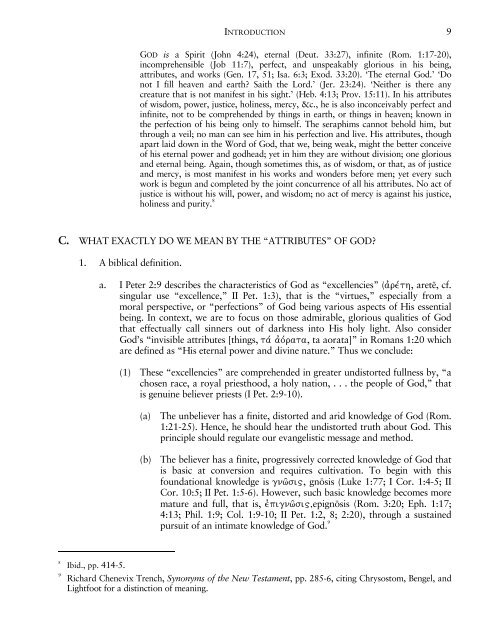that I should obey Him? - Future Israel Ministries
that I should obey Him? - Future Israel Ministries
that I should obey Him? - Future Israel Ministries
You also want an ePaper? Increase the reach of your titles
YUMPU automatically turns print PDFs into web optimized ePapers that Google loves.
INTRODUCTION 9<br />
GOD is a Spirit (John 4:24), eternal (Deut. 33:27), infinite (Rom. 1:17-20),<br />
incomprehensible (Job 11:7), perfect, and unspeakably glorious in his being,<br />
attributes, and works (Gen. 17, 51; Isa. 6:3; Exod. 33:20). ‘The eternal God.’ ‘Do<br />
not I fill heaven and earth? Saith the Lord.’ (Jer. 23:24). ‘Neither is there any<br />
creature <strong>that</strong> is not manifest in his sight.’ (Heb. 4:13; Prov. 15:11). In his attributes<br />
of wisdom, power, justice, holiness, mercy, &c., he is also inconceivably perfect and<br />
infinite, not to be comprehended by things in earth, or things in heaven; known in<br />
the perfection of his being only to himself. The seraphims cannot behold him, but<br />
through a veil; no man can see him in his perfection and live. His attributes, though<br />
apart laid down in the Word of God, <strong>that</strong> we, being weak, might the better conceive<br />
of his eternal power and godhead; yet in him they are without division; one glorious<br />
and eternal being. Again, though sometimes this, as of wisdom, or <strong>that</strong>, as of justice<br />
and mercy, is most manifest in his works and wonders before men; yet every such<br />
work is begun and completed by the joint concurrence of all his attributes. No act of<br />
justice is without his will, power, and wisdom; no act of mercy is against his justice,<br />
holiness and purity. 8<br />
C. WHAT EXACTLY DO WE MEAN BY THE “ATTRIBUTES” OF GOD?<br />
1. A biblical definition.<br />
8 Ibid., pp. 414-5.<br />
a. I Peter 2:9 describes the characteristics of God as “excellencies” (ajrevth, aretē, cf.<br />
singular use “excellence,” II Pet. 1:3), <strong>that</strong> is the “virtues,” especially from a<br />
moral perspective, or “perfections” of God being various aspects of His essential<br />
being. In context, we are to focus on those admirable, glorious qualities of God<br />
<strong>that</strong> effectually call sinners out of darkness into His holy light. Also consider<br />
God’s “invisible attributes [things, tav ajovrata, ta aorata]” in Romans 1:20 which<br />
are defined as “His eternal power and divine nature.” Thus we conclude:<br />
(1) These “excellencies” are comprehended in greater undistorted fullness by, “a<br />
chosen race, a royal priesthood, a holy nation, . . . the people of God,” <strong>that</strong><br />
is genuine believer priests (I Pet. 2:9-10).<br />
(a) The unbeliever has a finite, distorted and arid knowledge of God (Rom.<br />
1:21-25). Hence, he <strong>should</strong> hear the undistorted truth about God. This<br />
principle <strong>should</strong> regulate our evangelistic message and method.<br />
(b) The believer has a finite, progressively corrected knowledge of God <strong>that</strong><br />
is basic at conversion and requires cultivation. To begin with this<br />
foundational knowledge is gnw'si", gnōsis (Luke 1:77; I Cor. 1:4-5; II<br />
Cor. 10:5; II Pet. 1:5-6). However, such basic knowledge becomes more<br />
mature and full, <strong>that</strong> is, ejpignw'si",epignōsis (Rom. 3:20; Eph. 1:17;<br />
4:13; Phil. 1:9; Col. 1:9-10; II Pet. 1:2, 8; 2:20), through a sustained<br />
pursuit of an intimate knowledge of God. 9<br />
9<br />
Richard Chenevix Trench, Synonyms of the New Testament, pp. 285-6, citing Chrysostom, Bengel, and<br />
Lightfoot for a distinction of meaning.


